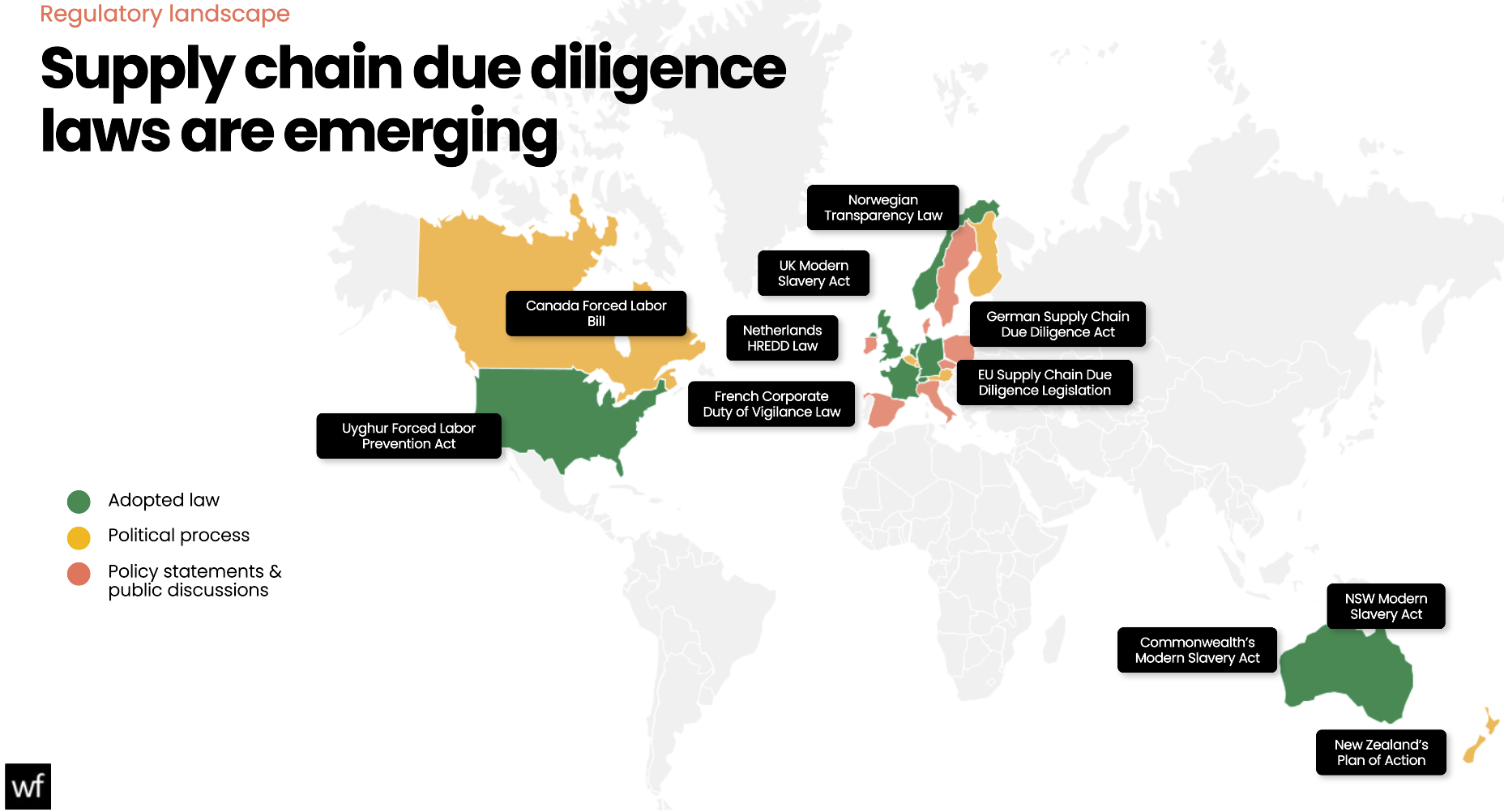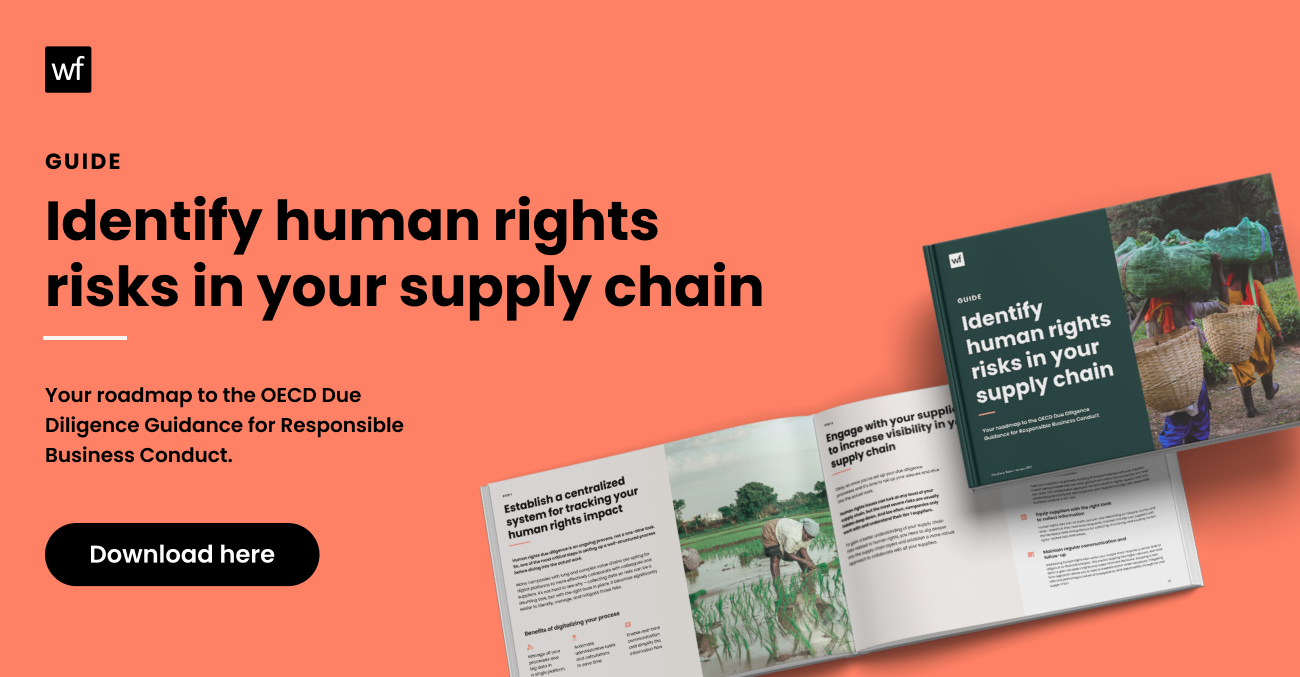The ultimate guide to Human Rights Due Diligence laws – who’s affected and how to comply

Updated: April 2023
Over the past few years, more and more countries have started to adopt mandatory Human Rights Due Diligence (HRDD) laws affecting domestic and foreign businesses operating in the country. Although businesses have been encouraged to take responsibility for their supply chains for several decades, recent research shows that a voluntary approach is not enough to protect the environment and poor working conditions in multi-tier supply chains.
As a result, governments worldwide are beginning to make the necessary changes on the legal level to ensure companies are being held responsible for what’s happening – even deep down their supply chains.
In this blog, we’ve gathered all the new and upcoming due diligence laws and legislative proposals you should know about. Find out whether or not your company is affected and exactly what you’ll do to comply. Let’s have a look!

New Human Rights Due Diligence laws are emerging worldwide – watch our webinar to learn how this rapidly changing landscape affects businesses.
1. European Commission’s proposal for a Directive on Corporate Sustainability Due Diligence
In February 2022, the European Commission proposed a union-wide Directive on Corporate Sustainability Due Diligence(CSDDD) to better identify and mitigate risks lurking in EU companies' value chains. The proposal's ultimate purpose is for companies to systematically exercise due diligence and thus make more data available on human rights, labor rights, and environmental risks and adverse impacts.
The proposal suggests the Directive will be based on the existing OECD Due Diligence Guidance for Responsible Business Conduct and the UN Guiding Principles on Business and Human Rights framework.
But who is affected by the EU's CSDDD?
But who is affected by the EU's CSDDD?
-
EU Companies with more than 500 employees and over 150 million EUR turnover worldwide.
-
Large EU companies with more than 250 employees and over 40 million EUR turnover worldwide in the following high-risk sectors: agriculture, garment, and minerals
-
Large non-EU companies with over 40 million EUR turnover in the EU in the following high-risk sectors: agriculture, garment, and minerals
-
SMEs, including micro companies, are excluded from the due diligence duty due to the heavy reporting burden. They will, however, still be exposed to some of the costs and burdens through business relationships with in-scope companies as large companies are expected to pass on demands to their suppliers.
The EU's Corporate Sustainability Due Diligence proposal will require companies to:
- Integrate due diligence into the company's policy and strategy and establish a code of conduct for this purpose.
- Set up a strategy to identify potential and actual impacts. Company directions must be put in place and oversee the due diligence process.
- Companies subjected to EU CSRD must publish the due diligence strategy annually, while companies not subject to EU CSRD have to publish an annual statement.
2. The Netherland’s Due Diligence Legislation – the Responsible Business Conduct Act
In addition to the Child Labour Due Diligence Law, which has yet to come into force, the Dutch government has recently proposed a new broader law obligating human and environmental due diligence, called the Responsible Business Conduct Act. The draft of the law is currently under debate and is still waiting to be finalized.
The Responsible Business Conduct Act will cover human rights, labor rights, and environmental due diligence. It will apply to Dutch companies and non-Dutch companies operating in the Netherlands exceeding the threshold for at least two of the three criteria: An annual turnover of at least 40 million EUR, a balance of at least 20 million EUR or having over 250 employees.
The companies covered by the Responsible Business Conduct Act are required to:
- Integrate due diligence into the company’s policies and business processes.
- Identify and analyze real and potential impacts.
- Set and carry out an action plan to prevent and mitigate impacts by prioritizing risks.
- Monitor the effectiveness of measurements in place.
- Set up a remediation process or cooperate with an existing one.
- Annually report on the company’s due diligence process – including findings and results.
3. France’s Corporate Duty of Vigilance Law (Loi de Vigilance)
In 2017, France adopted a law obligating large companies to carry out human rights and environmental due diligence and publish a Vigilance Plan annually. The law was adopted to ensure that large French companies are taking the measures needed to identify and prevent human rights and environmental violations in their supply chains.
The French Corporate Duty of Vigilance Law applies to French companies with more than 5,000 employees worldwide and non-French companies operating in France with more than 10,000 employees worldwide. Its requirements are:
- Establish and effectively implement a vigilance plan that includes
(i) risk mapping: identification, analysis, and ranking of potential risks;
(ii) steps implemented to address, mitigate and prevent risks and violations;
(iii) outline of procedures implemented for periodically assessing the company’s subsidiaries, subcontractors, and supplier’s compliance;
(iiii) a method for identifying existing or potential risks in cooperation with relevant trade unions; - A monitoring scheme to follow up on the measures implemented and assess their efficiency.
- Publish the vigilance plan annually.
4. Germany's Supply Chain Due Diligence Act (LkSG)
In January 2023, Germany’s Supply Chain Due Diligence Act (the LkSG) came into force – making it mandatory for larger businesses in Germany to conduct supply chain risk analyses to better understand environmental and human rights risks and negative impact in global supply chains.
The law applies to businesses domiciled or selling goods and services in Germany with 3,000 or more employees. From 2024 on, it’ll also include businesses domiciled or selling goods and services in Germany with 1,000 or more employees.
The requirements of Germany’s Supply Chain Due Diligence Law are:
- Establish a risk management system.
- Designate a responsible person within the company.
- Perform regular risk analyses and preventive measurements in own operations, subsidiaries, direct suppliers, and indirect suppliers.
- Establish a complaints mechanism and take remedial action.
- Publish progress reports on the website and submit them to the relevant authority annually.
5. Norway’s Transparency Act
The Norwegian Transparency Act entered into force in July 2022, obligating in-scope companies to conduct human rights and decent work due diligence and follow-ups in their supply chains and business relationships – and to communicate their findings externally.
The Transparency Act applies to companies based in Norway and foreign companies selling there that exceed the threshold for at least two of the three criteria: An annual turnover of at least 70 million NOK, a balance of at least NOK 35 million NOK, or an average number of 50 full-time employees (or the equivalent annual man-hours).
Companies covered by the the Norwegian Transparency Act are required to:
- Embed responsible business conduct into the company’s policies.
- Identify and implement measures to cease, prevent and mitigate impacts based on risk prioritization.
- Track implementation and results.
- Transparently inform consumers or anyone interested upon request.
- Annually publish reports on the due diligence assessments on the company’s website no later than June 30th each year.
6. Motion for an Austrian Supply Chain Act
In 2021, a motion for a supply chain act was presented in the Austrian parliament, aiming to make the necessary changes on a legal level to ensure that companies are taking responsibility for what is happening within their supply chains when it comes to human rights, labor rights, and the environment. It will apply to all Austrian and non-Austrian companies operating in the country. A minimum turnover has yet to be defined.
Companies covered by the Austrian Supply Chain Act will be required to:
- Carry out due diligence at least annually.
- Publish a report annually on the progress.
- Conduct risk analysis.
- Follow-up measures to stop and prevent adverse impacts in its entire global supply chain, own operations, subsidiaries, and subcontractors.
- Regular effectiveness reviews on the measurements in place.
- Set up an early warning system appropriate to the size of the company.
7. UK Modern Slavery Act
In 2015, the UK government introduced the Modern Slavery Act, which requires in-scope companies to prepare and publish a modern slavery and human trafficking transparency act every financial year. In 2018, the companies affected by the legislation were also required to register on the government’s Moderns Slavery Contact Database to get more guidance and resources on producing a modern slavery statement.
The Modern Slavery Act applies to any company carrying out some or all of its business in the UK with a global turnover of 36 million GBP. It requires the companies to prepare and publish a slavery and human trafficking statement for each financial year.
The statement must disclose: The steps the organization took that financial year to ensure that modern slavery and human trafficking are not taking place in any of its supply chains or own operations; or that the organization has not taken such steps.
8. Canada's Forced Labor Bill (BILL S-211)
In late 2021, the Minister of Labor announced the introduction of legislation aimed to increase transparency into Canadian businesses' global supply chains to identify and eradicate forced and child labor. The bill was passed by the Senate in April 2022 and is expected to come into force on January 1 of 2024 after it receives royal assent in 2023.
The bill will apply both to government institutions and private entities that produce, sell or distribute goods, or import goods into Canada that meet at least two of the three conditions: has at least 20 million CAD in assets, the entity has generated at least 40 million CAD in revenue or the entity employs an average of at least 250 employees.
The organizations that fall under the bill will be required to:
- Annually report on the entity’s process and achievements.
- Information required in the reports includes; the entity’s due diligence processes, the relevant training provided to its employees, and an assessment of the effectiveness of the processes in place to ensure forced and child labor are not present in its business and supply chains.
- Make the report available on the entity’s website, and if the entity is incorporated under the Canada Business Corporations Act, it is also required to distribute it to each shareholder.
9. The US Uyghur Forced Labor Prevention Act
In June 2022, the US Uyghur Forced Labor Prevention Act (UFLPA) came into force, requiring companies that source material from the Xinjiang region in China to prove that their supply chains are not tainted with forced labor if they want to import their goods into the US.
The Act primarily targets companies in the four following high-risk sectors: apparel, cotton and cotton products, tomatoes and downstream products, and silica-based products (including polysilicon).
The Uyghur Forced Labor Prevention Act require companies to:
- Exercise human rights due diligence and supply chain tracing to prove that goods were not sourced from Xinjiang, or, if they are from the region, that they were not produced with forced labor;
- Provide supply chain traceability documents for the entire supply chain from the origin to the final product;
- A complete list of all the workers at entities subjected to the rebuttable presumption;
- Proof that workers were not subject to forced labor practices.
10. Australia’s Modern Slavery Act
Australia’s Modern Slavery Act came into force in 2019, requiring larger companies in Australia to publicly report on how they are preventing and addressing risks related to modern slavery in their operations and supply chains. It applies to Australian companies or companies operating in Australia with annual total revenue of more than 100 million AUD.
The companies are required to annually prepare and submit a statement on what actions are being taken to prevent and address modern slavery in the company’s supply chain or own operations.
Each statement must address the following seven mandatory criteria:
- Identify the reporting entity.
- Describe the reporting entity’s structure, operations, and supply chains.
- Describe the risks of modern slavery practices in the operations and supply chains of the reporting entity and any entities it owns or controls.
- Inform on what actions are taken by the reporting entity and any entities it owns or controls to assess and address these risks, including due diligence and remediation processes.
- Describe how the reporting entity assesses the effectiveness of these actions.
- Describe the process of consultation with any entities the reporting entity owns or controls (a joint statement must also describe consultation with the entity giving the statement).
- Provide any other relevant information.
11. Belgian Due Diligence Law proposal
In April 2021, the Federal Parliament voted in favor of a Belgian due diligence law proposal – taking the first steps towards strengthening companies’ obligation to take control of their supply chains. The law aims for companies to set up a vigilance plan to identify and prevent human rights violations and mitigate social and environmental risks in their supply chains and subsidiary companies.
It has not yet passed as a law, and is still under the Belgian standard legislative process.
Meet due diligence requirements with ease in Worldfavor
Meeting new and upcoming supply chain due diligence requirements may feel overwhelming. Lighten your workload by automating and digitalizing your due diligence process in Worldfavor! The platform helps you collect, aggregate, and get actionable insight into your data – so you can meet any legal requirements with ease. Want to find out how your company could benefit from Worldfavor? Contact us for a personalized demo today!
This piece is based on the European Coalition for Corporate Justice's comparative table on due diligence laws and legislative proposals in Europe
Related blog posts you might like:
- How the EU's ban on products made with forced labor will affect your company
- The EU's new corporate sustainability due diligence directive is approaching – are you ready?
- Responsible business conduct in uncertain times: why human rights due diligence is key to minimizing supply chain risks






%20as%20the%20deadline%20approaches.%20Learn%20about%20compliance%20requirements%2c%20potential%20delays%2c%20and%20key%20updates..png)

